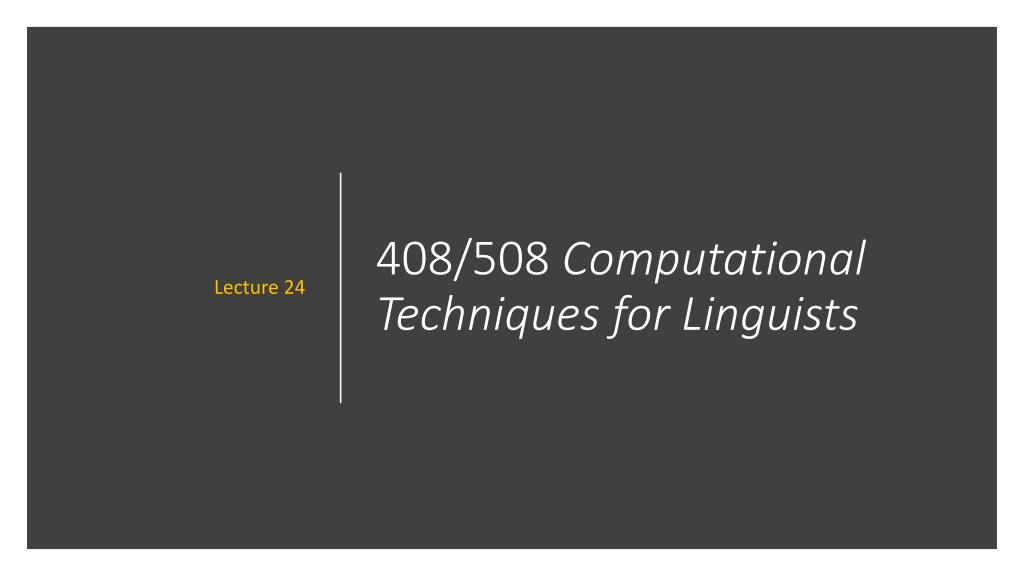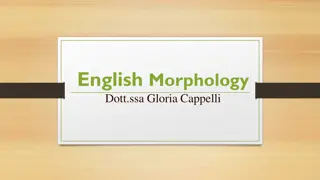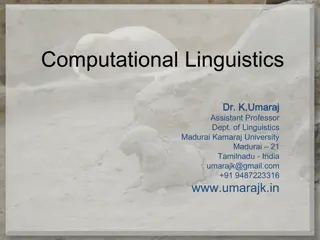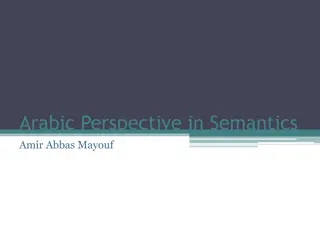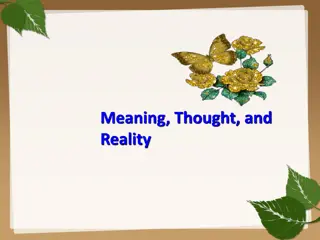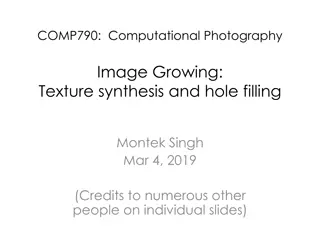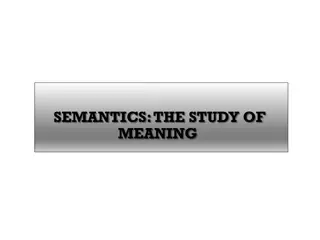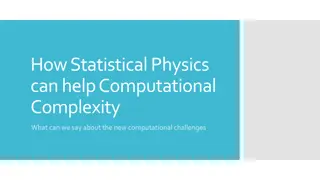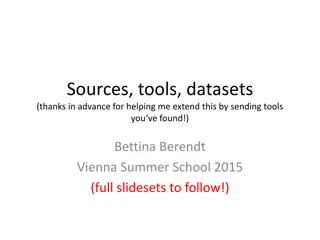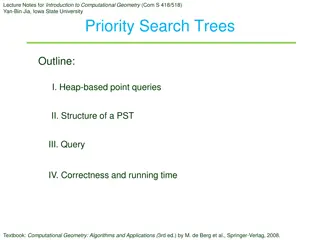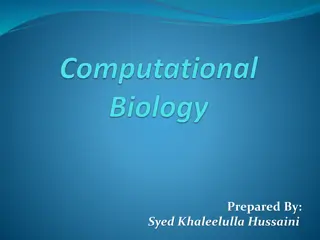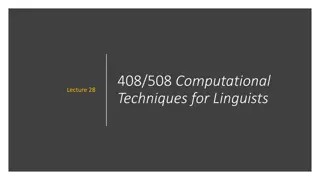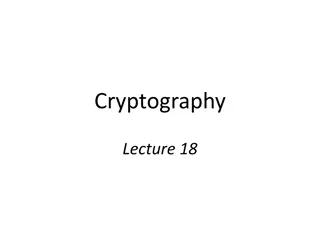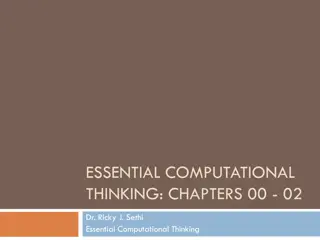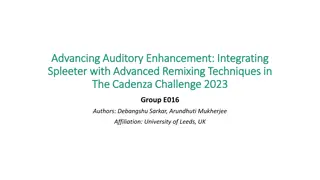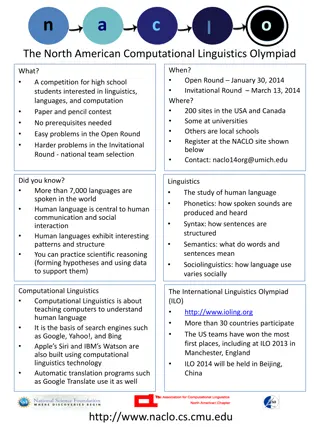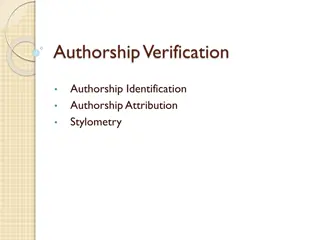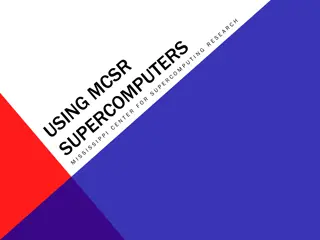Exploring Computational Techniques with NLTK for Linguists
Dive into the world of computational techniques for linguists with NLTK in Lecture 24. Learn about list comprehensions, conditional forms, tokenization, part-of-speech tagging, parsing, chunking, concordance, similarity, common contexts, dispersion plots, and more. Discover where NLTK is installed on your computer and unleash the power of Anaconda distribution with over 250 pre-installed packages.
Download Presentation

Please find below an Image/Link to download the presentation.
The content on the website is provided AS IS for your information and personal use only. It may not be sold, licensed, or shared on other websites without obtaining consent from the author. Download presentation by click this link. If you encounter any issues during the download, it is possible that the publisher has removed the file from their server.
E N D
Presentation Transcript
408/508 Computational Techniques for Linguists Lecture 24
Last Time Started playing with nltk Python list comprehensions conditional form: [word for word in alice if len(word) == 14] alice2 = [word for word in alice if word != ',' and word != '.' and word != '?']
Today's Topics Homework 11 More cool stuff with nltk today 1. nltk.word_tokenize(string) 2. nltk.pos_tag(list) 3. treebank.parsed_sents() and .draw() 4. nltk.chunk.ne_chunk(tuples) 5. text.concordance(word) 6. text.similar(word) 7. text.common_contexts(list) 8. text.dispersion_plot()
nltk Where is it installed on my computer? Anaconda distribution comes with over 250 packages automatically installed
Tokenization: nltk.word_tokenize() Compare (punctuation are words): Recall: >>> nltk.word_tokenize(text) >>> text = 'Alice was beginning to get very tired of sitting by her sister on the bank, and of having nothing to do. Once or twice she had peeped into the book her sister was reading, but it had no pictures or conversations in it, "and what is the use of a book," thought Alice, "without pictures or conversations?"\nSo she was considering in her own mind (as well as she could, for the hot day made her feel very sleepy and stupid), whether the pleasure of making a daisy-chain would be worth the trouble of getting up and picking the daisies, when suddenly a White Rabbit with pink eyes ran close by her. ' ['Alice', 'was', 'beginning', 'to', 'get', 'very', 'tired', 'of', 'sitting', 'by', 'her', 'sister', 'on', 'the', 'bank', ',', 'and', 'of', 'having', 'nothing', 'to', 'do', '.', 'Once', 'or', 'twice', 'she', 'had', 'peeped', 'into', 'the', 'book', 'her', 'sister', 'was', 'reading', ',', 'but', 'it', 'had', 'no', 'pictures', 'or', 'conversations', 'in', 'it', ',', '``', 'and', >>> text.split() 'what', 'is', 'the', 'use', 'of', 'a', 'book', ',', "''", 'thought', 'Alice', ',', '``', 'without', 'pictures', 'or', ['Alice', 'was', 'beginning', 'to', 'get', 'very', 'tired', 'of', 'sitting', 'by', 'her', 'sister', 'on', 'the', 'bank,', 'and', 'conversations', '?', "''", 'So', 'she', 'was', 'considering', 'in', 'her', 'own', 'mind', '(', 'as', 'well', 'as', 'she', 'of', 'having', 'nothing', 'to', 'do.', 'Once', 'or', 'twice', 'she', 'had', 'peeped', 'into', 'the', 'book', 'her', 'could', ',', 'for', 'the', 'hot', 'day', 'made', 'her', 'feel', 'very', 'sleepy', 'and', 'stupid', ')', ',', 'whether', 'the', 'sister', 'was', 'reading,', 'but', 'it', 'had', 'no', 'pictures', 'or', 'conversations', 'in', 'it,', '"and', 'what', 'is', 'pleasure', 'of', 'making', 'a', 'daisy-chain', 'would', 'be', 'worth', 'the', 'trouble', 'of', 'getting', 'up', 'and', 'the', 'use', 'of', 'a', 'book,"', 'thought', 'Alice,', '"without', 'pictures', 'or', 'conversations?"', 'So', 'she', 'picking', 'the', 'daisies', ',', 'when', 'suddenly', 'a', 'White', 'Rabbit', 'with', 'pink', 'eyes', 'ran', 'close', 'by', 'was', 'considering', 'in', 'her', 'own', 'mind', '(as', 'well', 'as', 'she', 'could,', 'for', 'the', 'hot', 'day', 'made', 'her', '.'] 'her', 'feel', 'very', 'sleepy', 'and', 'stupid),', 'whether', 'the', 'pleasure', 'of', 'making', 'a', 'daisy-chain', >>> len(nltk.word_tokenize(text)) 'would', 'be', 'worth', 'the', 'trouble', 'of', 'getting', 'up', 'and', 'picking', 'the', 'daisies,', 'when', 'suddenly', 'a', 'White', 'Rabbit', 'with', 'pink', 'eyes', 'ran', 'close', 'by', 'her.'] 129 >>> len(text.split()) 112
Part of Speech Tagging: nltk.pos_tag() Once tokenized, we can apply POS tagging >>> words = nltk.word_tokenize(text) >>> nltk.pos_tag(words) produces list of tuples (word, tag) [('Alice', 'NNP'), ('was', 'VBD'), ('beginning', 'VBG'), ('to', 'TO'), ('get', 'VB'), ('very', 'RB'), ('tired', 'JJ'), ('of', 'IN'), ('sitting', 'VBG'), ('by', 'IN'), ('her', 'PRP$'), ('sister', 'NN'), ('on', 'IN'), ('the', 'DT'), ('bank', 'NN'), (',', ','), ('and', 'CC'), ('of', 'IN'), ('having', 'VBG'), ('nothing', 'NN'), ('to', 'TO'), ('do', 'VB'), ('.', '.'), ('Once', 'VB'), ('or', 'CC'), ('twice', 'VB'), ('she', 'PRP'), ('had', 'VBD'), ('peeped', 'VBN'), ('into', 'IN'), ('the', 'DT'), ('book', 'NN'), ('her', 'PRP$'), ('sister', 'NN'), ('was', 'VBD'), ('reading', 'VBG'), (',', ','), ('but', 'CC'), ('it', 'PRP'), ('had', 'VBD'), ('no', 'DT'), ('pictures', 'NNS'), ('or', 'CC'), ('conversations', 'NNS'), ('in', 'IN'), ('it', 'PRP'), (',', ','), ('``', '``'), ('and', 'CC'), ('what', 'WP'), ('is', 'VBZ'), ('the', 'DT'), ('use', 'NN'), ('of', 'IN'), ('a', 'DT'), ('book', 'NN'), (',', ','), ("''", "''"), ('thought', 'VBD'), ('Alice', 'NNP'), (',', ','), ('``', '``'), ('without', 'IN'), ('pictures', 'NNS'), ('or', 'CC'), ('conversations', 'NNS'), ('?', '.'), ("''", "''"), ('So', 'IN'), ('she', 'PRP'), ('was', 'VBD'), ('considering', 'VBG'), ('in', 'IN'), ('her', 'PRP$'), ('own', 'JJ'), ('mind', 'NN'), ('(', '('), ('as', 'RB'), ('well', 'RB'), ('as', 'IN'), ('she', 'PRP'), ('could', 'MD'), (',', ','), ('for', 'IN'), ('the', 'DT'), ('hot', 'JJ'), ('day', 'NN'), ('made', 'VBD'), ('her', 'PRP$'), ('feel', 'JJ'), ('very', 'RB'), ('sleepy', 'JJ'), ('and', 'CC'), ('stupid', 'JJ'), (')', ')'), (',', ','), ('whether', 'IN'), ('the', 'DT'), ('pleasure', 'NN'), ('of', 'IN'), ('making', 'VBG'), ('a', 'DT'), ('daisy-chain', 'NN'), ('would', 'MD'), ('be', 'VB'), ('worth', 'IN'), ('the', 'DT'), ('trouble', 'NN'), ('of', 'IN'), ('getting', 'VBG'), ('up', 'RP'), ('and', 'CC'), ('picking', 'VBG'), ('the', 'DT'), ('daisies', 'NNS'), (',', ','), ('when', 'WRB'), ('suddenly', 'RB'), ('a', 'DT'), ('White', 'NNP'), ('Rabbit', 'NN'), ('with', 'IN'), ('pink', 'JJ'), ('eyes', 'NNS'), ('ran', 'VBD'), ('close', 'RB'), ('by', 'IN'), ('her', 'PRP'), ('.', '.')]
Part of Speech Tagging: nltk.pos_tag() Output: [('Alice', 'NNP'), ('was', 'VBD'), ('beginning', 'VBG'), ('to', 'TO'), ('get', 'VB'), ('very', 'RB'), ('tired', 'JJ'), ('of', 'IN'), ('sitting', 'VBG'), ('by', 'IN'), ('her', 'PRP$'), ('sister', 'NN'), ('on', 'IN'), ('the', 'DT'), ('bank', 'NN'), (',', ','), ('and', 'CC'), ('of', 'IN'), ('having', 'VBG'), ('nothing', 'NN'), ('to', 'TO'), ('do', 'VB'), ('.', '.') Tagset (Penn Treebank): NN/NNS/NNP: common noun/NN plural/proper noun VB/VBD/VBG/VBZ/VBN: verb nonfinite form/past tense/gerund/3rd person singular present/ past participle PRP$: possessive pronoun DT: determiner IN: preposition JJ: adjective CC: coordinating conjunction TO: the word to >>> nltk.help.upenn_tagset('RB') RB: adverb occasionally unabatingly maddeningly adventurously professedly stirringly prominently technologically magisterially predominately swiftly fiscally pitilessly ...
Part of Speech Tagging: nltk.pos_tag() from Jurafsky and Martin (draft edition 3)
Penn Treebank There is a sample of the Penn Treebank Wall Street Journal (WSJ) corpus included 3,914 parsed sentences out of 49,000+ parsed sentences >>> from nltk.corpus import treebank >>> t = treebank.parsed_sents() >>> len(t) 3914 >>> t[-1].draw()
Named Entity (NE) chunking import nltk tuples = nltk.pos_tag(nltk.word_tokenize("No, it wasn't Black Monday.")) tuples [('No', 'DT'), (',', ','), ('it', 'PRP'), ('was', 'VBD'), ("n't", 'RB'), ('Black', 'NNP'), ('Monday', 'NNP'), ('.', '.')] nltk.chunk.ne_chunk(tuples) Tree('S', [('No', 'DT'), (',', ','), ('it', 'PRP'), ('was', 'VBD'), ("n't", 'RB'), Tree('PERSON', [('Black', 'NNP')]), ('Monday', 'NNP'), ('.', '.')]) >>> nltk.chunk.ne_chunk(tuples).draw()
Named Entity (NE) chunking nltk.chunk.ne_chunk(nltk.pos_tag(nltk.word_tokenize("President Biden is in New York today."))) Tree('S', [('President', 'NNP'), Tree('PERSON', [('Biden', 'NNP')]), ('is', 'VBZ'), ('in', 'IN'), Tree('GPE', [('New', 'NNP'), ('York', 'NNP')]), ('today', 'NN'), ('.', '.')]
nltk book: Language Processing and Python 1 Computing with Language: Texts and Words: http://www.nltk.org/book/ch01.html
nltk book: Language Processing and Python monstrous contemptible
nltk book: Language Processing and Python On my mac your order may be different depending on dict implementation:
nltk book: Language Processing and Python monstrous contemptible
nltk book: Language Processing and Python Inaugural Presidential Addresses text4.dispersion_plot(["citizens", "democracy", "freedom", "duties", "America"])
nltk book: Language Processing and Python 1.4 Counting Vocabulary <text> placeholder for some text object <word> placeholder for a word len(<text>) lexical diversity # of times <word> occurs in <text> word count no duplicate words no. of different words 1. set(<text>) 2. len(set(<text>)) 3. len(set(<text>)) / len(<text>) 4. <text>.count(<word>) 5. 100 * <text>.count(<word>) / len(<text>) % of <text> taken up by <word> 6.
nltk book: Language Processing and Python >>> def lex_diversity(text): ... return len(set(text)) / len(text) ... >>> from nltk.book import * *** Introductory Examples for the NLTK Book *** Type: 'texts()' or 'sents()' to list the materials. text1: Moby Dick by Herman Melville 1851 text2: Sense and Sensibility by Jane Austen 1811 text3: The Book of Genesis text4: Inaugural Address Corpus text5: Chat Corpus text6: Monty Python and the Holy Grail text7: Wall Street Journal text8: Personals Corpus text9: The Man Who Was Thursday by G . K . Chesterton 1908
nltk book: Language Processing and Python >>> for i in range(1,10): ... name = "text" + str(i) ... print(name, '{:.3f}'.format(lex_diversity(eval(name)))) ... text1 0.074 text2 0.048 text3 0.062 text4 0.066 text5 0.135 text6 0.128 text7 0.123 text8 0.228 text9 0.098 text2: Sense and Sensibility by Jane Austen 1811 text8: Personals Corpus
Homework 11 Term project proposal Email me Due Sunday midnight One paragraph sketch or page: what your project will be on Could be a HTML5 or a Webserver project nltk: exploratory work/experiment also fine
